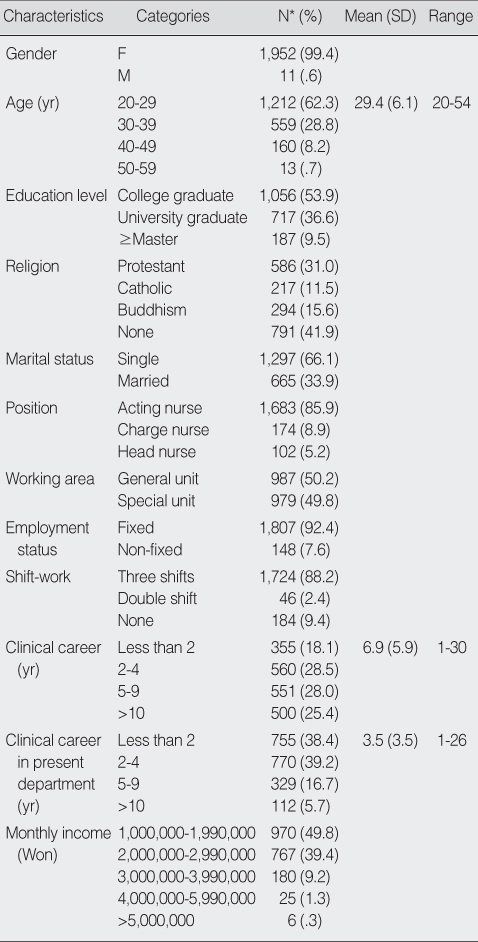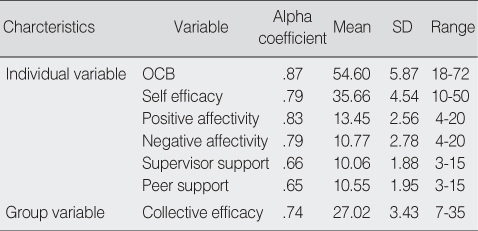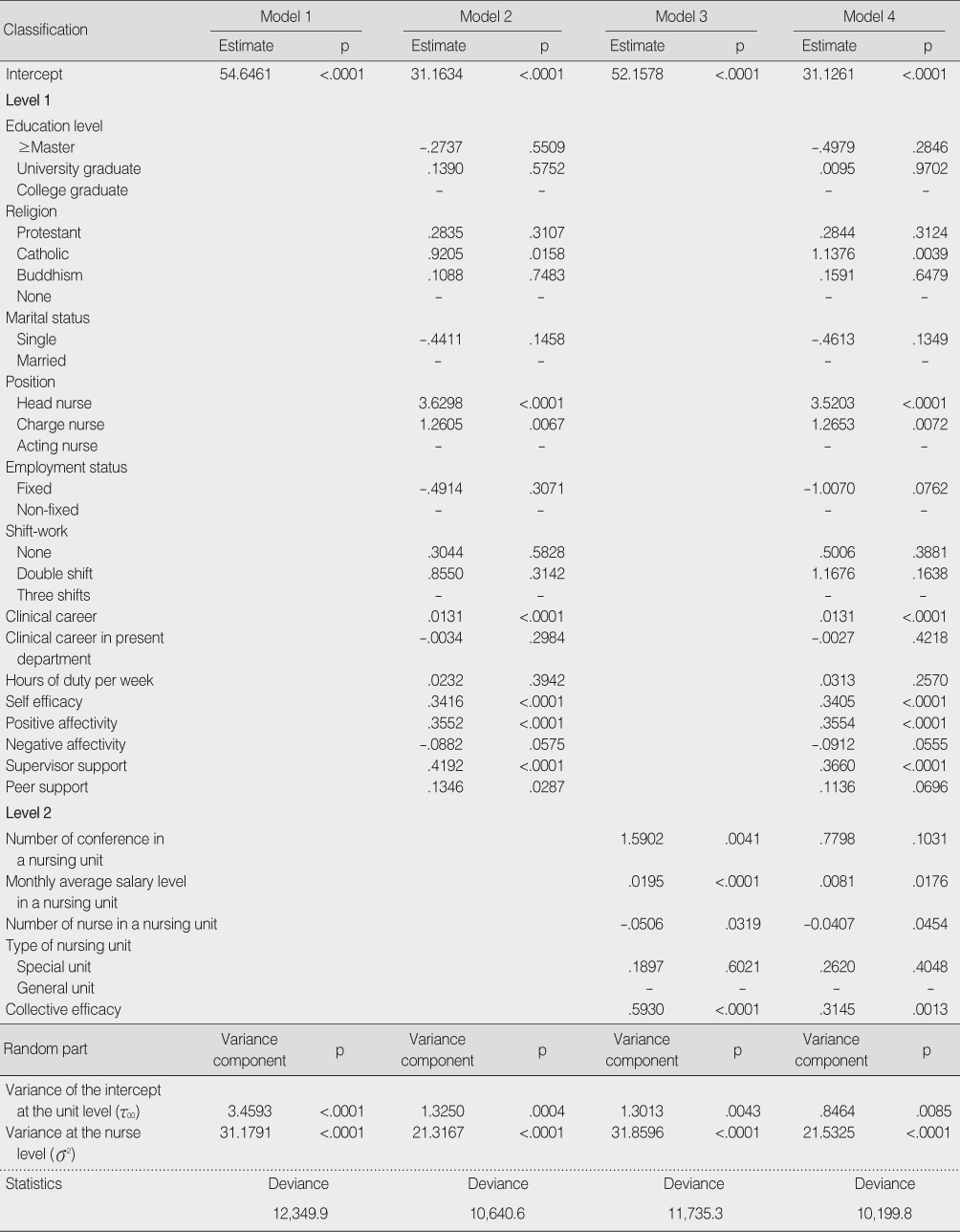Articles
- Page Path
- HOME > J Korean Acad Nurs > Volume 38(2); 2008 > Article
-
Original Article
- Identification of Factors related to Hospital Nurses' Organizational Citizenship Behavior using a Multilevel Analysis
- Yu Kyung Ko
-
Journal of Korean Academy of Nursing 2008;38(2):287-297.
DOI: https://doi.org/10.4040/jkan.2008.38.2.287
Published online: April 30, 2008
Full-time Lecturer, Department of Nursing Science, Konyang University, Daejeon, Korea.
- Address reprint requests to: Ko, Yu Kyung. Department of Nursing Science, College of Medical Science, Konyang University, 685 Gasuwon-dong, Seo-gu, Daejeon 302-718, Korea. Tel: 82-42-600-6436, Fax: 82-42-600-6314, yukyko@konyang.ac.kr
• Received: August 21, 2007 • Accepted: March 31, 2008
Copyright © 2008 Korean Society of Nursing Science
Abstract
-
Purpose
- The purpose of this study was to identify factors related to nurses' organizational citizenship behavior using multilevel analysis which included both nurse characteristics at individual levels and nursing unit characteristics at group levels.
-
Methods
- The sample was composed of 1,996 nurses who were selected from 182 nursing units in 28 hospitals in six metropolitan cities and seven provinces using cluster sampling. Data were collected using self-reported questionnaires from February to March 2006.
-
Results
- The results of the study indicated that individual level variables related to organizational citizenship behavior were religion, job position, clinical career, self efficacy, positive affectivity, and supervisor support. The group level variables related to organizational citizenship behavior were collective efficacy, number of nurses in a nursing unit, and the average salary level of a nursing unit. 30.9% of individual level variances of organizational citizenship behavior were explained by the nurses' individual level variables. The explanatory power of group level variables, which is related to group level variances of organizational citizenship behavior, was 75.5%.
-
Conclusion
- This research showed that it was necessary to develop appropriate strategies related to not only individual factors, but also higher-level organizational factors such as collective efficacy, to improve individual performances in the hospital.
- 1. Ahn EK. A model for clinical nurses'self-efficacy and work performance. 1999;Daejeon, Chungnam University. Unpublished master's thesis.
- 2. Bandura A. Self-efficacy: The exercise of control. 1997;NY, Freeman.
- 3. Bang EJ. The impact of SES on health: A multilevel analysis study. 2005;Seoul, Seoul National University. Unpublished master's thesis.
- 4. Button SB, Mathieu JE, Aikin KJ. An examination of the relative impact of assigned goals and self-efficacy on personal goals and performance over time. Journal of Applied Social Psychology. 1996;26:1084–1103.Article
- 5. Choi WS. Determinants of job satisfaction and organizational commitment in national university hospital employees. 2003;Seoul, Yonsei University. Unpublished master's thesis.
- 6. Chiu RK, Francesco AM. Dispositional traits and turnover intention: Examining the mediating role of job satisfaction and affective commitment. International Journal of Manpower. 2003;24:284–298.
- 7. Cobb S. Presidential Address-1976. Social support as moderator of life stress. Psychosomatic Medicine. 1976;38:300–314.ArticlePubMed
- 8. George JM. Mood and absence. Journal of Applied Psychology. 1989;74:317–324.Article
- 9. Goode D, Rowe K. Perceptions and experiences of primary nursing in an ICU: A combined method approach. Intensive & Critical Care Nursing. 2001;17:294–303.
- 10. Han WH. The moderating effects of efficacy on the relationship between job characteristics and job stress outcomes. Korean Journal of Personnel Administration. 2003a;27:33–57.
- 11. Han WH. The mediating effect of job satisfaction and self-efficacy in the relationships between dispositional traits and turnover intention. Korean Journal of Business. 2003b;12:2197–2215.
- 12. Iverson RD, Deery SJ. Understanding the "personological" basis of employee withdrawal: The influence of affective disposition on employee tardiness, early departure, and absenteeism. The Journal of Applied Psychology. 2001;86:856–866.ArticlePubMed
- 13. Jeon HS. Influence of Leader-Member Exchange and Organizational Citizenship Behavior in Nursing organization. 2003;Seoul, Ewha Womans University. Unpublished master's thesis.
- 14. Jex SM, Bliese PD. Efficacy beliefs as a moderator of the impact of work-related stressors: A multilevel study. The Journal of Applied Psychology. 1999;84:349–361.ArticlePubMed
- 15. Judge TA, Locke EA, Durham CC. The disposition causes of job satisfaction: A core evaluations approach. Research in Organization Behavior. 1997;19:151–188.
- 16. Kang DS, Cha DW. The impact of organizational justice, LMX quality, and psychological empowerment on serviceoriented organizational citizenship behaviors (OCBs). Korean Journal of Personnel Administration. 2004;28:263–287.
- 17. Kang SJ. Methodological characteristics of statistical multilevel models and applicational procedure. Journal of Education Evaluation. 1995;8(2):63–94.
- 18. Kang SJ, Jeon MJ, Chang JH. A comparative analysis on the problem behaviors of academic high school students and vocational high school students-3-level hierarchical linear models. Proceedings of 1st KEEP Conference. 2005;7:145–173.
- 19. Lindorff M. Is it better to perceive than receive? Social support, stress and strain for managers. Psychology, Health and Medicine. 2000;5:271–286.Article
- 20. Munchinsky PM. Psychology Applied to Work: An Introduction to Industrial and Organizational Psychology. 1983;Homewood, IL, Dorsey Press.
- 21. Organ DW. The goal soldier syndrome. Organizational citizenship behavior. 1988;Lexington MA, Lexington Books.
- 22. Park HO. An analysis of pay structure and management of hospital nurses. 2006;Seoul, Yonsei University. Unpublished doctoral dissertation.
- 23. Riggs ML, Knight PA. The impact of perceived group success-failure on motivational beliefs and attitudes: A casual model. The Journal of Applied Psychology. 1994;79:755–766.PubMed
- 24. Seo YJ, Kim JH. A study on job satisfaction and organizational commitment of medical insurance review nurses. Korean Journal of Health Policy and Administration. 2001;11:62–86.
- 25. Seo CH. The effect of supervisor's support on job involvement, organizational citizenship behavior and mediating job satisfaction. Journal of Tourism Research. 1999;22(3):93–112.
- 26. Shim M. A study on the correlation among transformational and transactional leadership of head nurse, job satisfaction, organizational commitment, and job performance of nurse. 2005;Kangnung, Kwandong University. Unpublished master's thesis.
- 27. Snijders TA, Bosker RJ. Multilevel Analysis-An introduction to basic and advanced multilevel modeling. 1999;London, Thousand Oaks, Calif., Sage Publications.
- 28. Takase M, Maude P, Manias E. Explaining nurses' work behaviour from their perception of the environment and work values. International Journal of Nursing Studies. 2005;42:889–898.ArticlePubMed
- 29. Tzeng HM. Nurses' self-assessment of their nursing competencies, job demands and job performance in the Taiwan hospital system. International Journal of Nursing Studies. 2004;41:487–496.ArticlePubMed
- 30. Watson D, Clark LA. Negative affectivity: The disposition to experience aversive emotional state. Psychological Bulletin. 1984;96:465–490.ArticlePubMed
REFERENCES
Figure & Data
REFERENCES
Citations
Citations to this article as recorded by 

- The Structural Relationship among Intrinsic/Extrinsic Motivation, Instruction Efficacy, and Organizational Citizenship Behavior in Childcare Teachers
Kyung Heui Park, Ha Young Min
Human Ecology Research.2025; 63(2): 137. CrossRef - Relationships between job burnout, ethical climate and organizational citizenship behaviour among registered nurses: A cross‐sectional study
Lyu Wang, Xiaoyu Dong, Yan An, Cancan Chen, Marion Eckert, Greg Sharplin, Jennifer Fish, Xiuzhen Fan
International Journal of Nursing Practice.2023;[Epub] CrossRef - Impact of a Chaxu Atmosphere on Nurses’ Organizational Responsibility behavior—The Mediating Roles of Envy and Silence
Shu-E Zhang, Hui Wu, Xiao-He Wang, Chen-Xi Zhao, Tao Sun, De-Pin Cao
Psychology Research and Behavior Management.2021; Volume 14: 1187. CrossRef - The Personality Traits in the Defense Industry: The Mediating Role of Organizational Citizenship Behavior
Edip Sabahattin Mete
Sage Open.2020;[Epub] CrossRef - Ecological Predictors of Recovery-Oriented Practices Among Psychiatric Nurses in South Korea
Suyon Baek
Journal of Psychosocial Nursing and Mental Health Services.2020; 58(11): 37. CrossRef - Moderating Effects of Career Commitment in the Relationship between Work Engagement and Organizational Citizenship Behaviors of the Clinical Nurses
Eun Jeong Song, Mi Jeong Kim, Myung Suk Koh
Journal of Korean Academy of Nursing Administration.2019; 25(3): 167. CrossRef - Person-Organization Value Congruence between Authentic Leadership of Head Nurses and Organizational Citizenship Behavior in Clinical Nurses
Joung Ok Kim, Se Young Kim
Journal of Korean Academy of Nursing Administration.2017; 23(5): 515. CrossRef - Work stress and organizational citizenship behaviors among nurses
Reza Agheli, Fariborz Roshangar, Kobra Parvan, Parvin Sarbakhsh, Solmaz Shafeh
Annals of Tropical Medicine and Public Health.2017; 10(6): 1453. CrossRef - The Influences of Workplace Spirituality and Emotional Intelligence on the Organizational Citizenship Behavior for Clinical Nurses
Myung-Sook Yoo
The Korean Journal of Health Service Management.2016; 10(2): 59. CrossRef - Effects of Workplace Spirituality and Organizational Citizenship Behavior on Nursing Performance
Gyeong Min Noh, Myung Sook Yoo
Journal of Korean Academy of Nursing Administration.2016; 22(3): 251. CrossRef - Comparing Risk-adjusted In-hospital Mortality for Craniotomies : Logistic Regression versus Multilevel Analysis
Sun-Hee Kim, Kwang-Soo Lee
The Korean Journal of Health Service Management.2015; 9(2): 81. CrossRef - The Autonomy, Nursing Performance based on the Awareness and satisfaction of EMR System for Nurses
Jisook Kang, Sunja Kim, Wonjeong Kim
Journal of the Korea Academia-Industrial cooperation Society.2015; 16(9): 6061. CrossRef - The Multilevel Analysis for Factors effecting on the Health-related Quality of Life in Dental Technicians
Tae-Yong Lee, Won-Soo Kim, Hye-Eun Lee
Journal of the Korea Academia-Industrial cooperation Society.2014; 15(6): 3625. CrossRef - The Effects of Self-efficacy and Collective Efficacy on Job Satisfaction and Organizational Commitment of Nurses
Gun Saeng Kang, Jeong Hee Kim
Korean Journal of Occupational Health Nursing.2014; 23(3): 123. CrossRef - Factors related to Nurses' Patient Identification Behavior and the Moderating Effect of Person-organization Value Congruence Climate within Nursing Units
Young Mee Kim, Seung-Wan Kang, Se Young Kim
Journal of Korean Academy of Nursing.2014; 44(2): 198. CrossRef - The Influence of Gamers' Characteristics on the Emergent Party Play : Based on Organizational Citizenship Behavior Theory
Ji Hoon Ahn, Chris Seoyun Choi
Journal of Korea Game Society.2014; 14(4): 7. CrossRef - Raising Nurses' Job Satisfaction Through Patient-Oriented Perception and Organizational Citizenship Behaviors
Ching Sheng Chang, Su-Yueh Chen, Yi Ting Lan
Nursing Research.2011; 60(1): 40. CrossRef - Moderating Effect of Nurses’ Customer-Oriented Perception Between Organizational Citizenship Behaviors and Satisfaction
Ching Sheng Chang, Hae Ching Chang
Western Journal of Nursing Research.2010; 32(5): 628. CrossRef - Impact of Health Insurance Type on the Quality of Hemodialysis Services: A Multilevel Analysis
Jin-Hee Jung, Soon-Man Kwon, Kyoung-Hoon Kim, Seon-Kyoung Lee, Dong-Sook Kim
Journal of Preventive Medicine and Public Health.2010; 43(3): 245. CrossRef - Motivating Nurses' Organizational Citizenship Behaviors by Customer-Oriented Perception for Evidence-Based Practice
Ching Sheng Chang, Hae Ching Chang
Worldviews on Evidence-Based Nursing.2010; 7(4): 214. CrossRef - Factors influencing Nurses' Organizational Citizenship Behavior
Junhee Park, Eunkyung Yun, Sangsook Han
Journal of Korean Academy of Nursing.2009; 39(4): 499. CrossRef - Multi-level Analysis of Factors related to Quality of Services in Long-term Care Hospitals
Seon-heui Lee
Journal of Korean Academy of Nursing.2009; 39(3): 409. CrossRef
Identification of Factors related to Hospital Nurses' Organizational Citizenship Behavior using a Multilevel Analysis
Identification of Factors related to Hospital Nurses' Organizational Citizenship Behavior using a Multilevel Analysis
General Characteristics of Subjects (N=1,966)
*Missing data excluded.
Item Mean Scores of Variables
OCB=Organizational citizenship behavior.
Multilevel Analysis of the Four Fitted Models on Organizational Citizenship Behavior
Table 1
General Characteristics of Subjects (N=1,966)
*Missing data excluded.
Table 2
Item Mean Scores of Variables
OCB=Organizational citizenship behavior.
Table 3
Multilevel Analysis of the Four Fitted Models on Organizational Citizenship Behavior
 KSNS
KSNS
 E-SUBMISSION
E-SUBMISSION



 Cite
Cite

